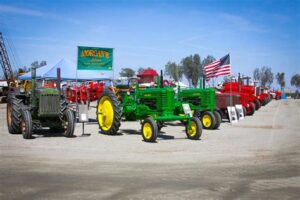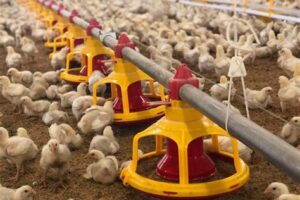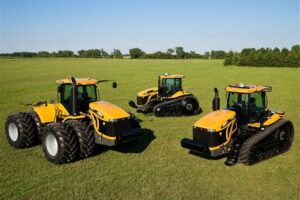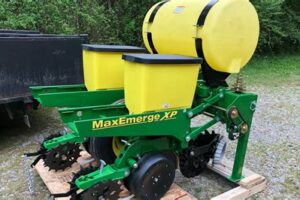Farm equipment depreciation refers to the decrease in value of agricultural machinery and tools over time. Understanding this concept is crucial for farmers, as it helps them calculate the true cost of ownership and plan their equipment investments wisely. Factors such as usage, age, maintenance, and market conditions influence the rate of depreciation. By considering depreciation, farmers can make informed decisions about purchasing, selling, or leasing farm equipment.
When it comes to farming, having the right equipment is crucial for success. However, as with any type of machinery, farm equipment is subject to wear and tear over time. This constant use and exposure to harsh conditions can lead to depreciation, which affects both the value and efficiency of the machinery. Understanding farm equipment depreciation is essential for farmers who want to make informed decisions about their investments and ensure the long-term profitability of their operations. In this article, we will explore the concept of farm equipment depreciation, its causes, and its implications on the agricultural industry.
Introduction
Depreciation is an essential concept to understand when it comes to farm equipment. It refers to the decrease in the value of machinery and vehicles over time due to wear and tear, obsolescence, or other factors. As a farmer or agricultural business owner, it is crucial to be aware of how depreciation affects your bottom line and financial planning. This article aims to provide a comprehensive overview of farm equipment depreciation, its causes, and its implications for farmers.
Understanding Depreciation
Depreciation is a natural and inevitable process that affects all types of machinery, including farm equipment. As equipment is used over time, its value decreases due to factors such as physical deterioration, technological advancements, market changes, and even changes in government regulations. Understanding how depreciation works is essential for making informed decisions regarding equipment purchases, replacements, and overall farm management.
Factors Affecting Farm Equipment Depreciation
Several key factors influence the rate at which farm equipment depreciates:
- Usage: The more frequently and intensively equipment is used, the faster it tends to depreciate.
- Maintenance: Proper maintenance and regular servicing can slow down the depreciation process.
- Age: Older equipment typically has a higher depreciation rate as newer models with enhanced features become available in the market.
- Technology: Advancements in technology can quickly render older equipment obsolete, leading to a more rapid depreciation.
- Market Demand: Changes in market demand for specific types of equipment can influence their depreciation rates.
- Resale Value: The expected resale value of equipment at the end of its useful life plays a significant role in determining its depreciation rate.
Methods of Depreciation Calculation
Several methods are commonly used for calculating farm equipment depreciation:
- Straight-Line Depreciation: This method allocates an equal amount of depreciation expense over the useful life of the equipment. It is simple and straightforward.
- Declining Balance Method: In this method, a higher depreciation expense is recognized during the early years of equipment use, gradually decreasing over time.
- Units of Production Method: This approach calculates depreciation based on the number of hours or units produced by the equipment. It is particularly useful for equipment that is heavily used during certain periods but remains idle during others.
Implications for Farmers
Farm equipment depreciation has several important implications for farmers:
- Financial Planning: Understanding equipment depreciation allows farmers to plan their finances effectively, accounting for future equipment replacements and upgrades.
- Tax Deductions: Depreciation expenses can be tax-deductible, reducing the overall tax burden for farmers.
- Equipment Replacement: Being aware of the depreciation rate helps farmers determine the optimal time for replacing old equipment with newer, more efficient models.
- Resale Value: Knowledge of depreciation rates assists farmers in estimating the future resale value of their equipment, enabling better budgeting and investment decisions.
Strategies to Minimize Depreciation
While depreciation is unavoidable, there are strategies farmers can employ to minimize its impact:
- Regular Maintenance: Proper maintenance and timely repairs can extend the useful life of equipment and slow down depreciation.
- Technology Upgrades: Keeping up with advancements in farm equipment technology can help farmers stay competitive and reduce the rate of depreciation.
- Leasing: Leasing equipment instead of purchasing can be advantageous, as it shifts the burden of depreciation onto the leasing company.
- Timely Replacement: Knowing when to replace old equipment can prevent excessive depreciation costs and improve overall farm efficiency.
Conclusion
Farm equipment depreciation is an essential aspect of farm management and financial planning. By understanding the causes and implications of depreciation, farmers can make informed decisions regarding equipment purchases, replacements, and upgrades. Implementing strategies to minimize depreciation can help optimize farm profitability while ensuring an efficient and modernized agricultural operation.
Importance of Depreciation in Farm Equipment
Farm equipment depreciation refers to the gradual decrease in the value of agricultural machinery and tools over time. Recognizing and accounting for this depreciation is crucial for farmers as it helps determine the true cost of ownership and plan for future investments.
Financial Considerations
Depreciation impacts the financial aspects of running a farm, as it directly affects the profitability and tax liabilities. Accurately calculating equipment depreciation allows farmers to track their assets’ value accurately, streamline financial planning, and make informed decisions regarding capital expenditures.
Budgeting and Replacement Planning
By factoring in depreciation, farmers can establish realistic budgets and effectively plan for future equipment replacements. Understanding when equipment is likely to significantly depreciate and estimating its residual value assists in determining the optimal time to replace or upgrade the machinery, thereby preventing unexpected failures and optimizing productivity.
Depreciation Methods and Calculations
Straight-Line Depreciation
The straight-line depreciation method evenly distributes the cost of a farm equipment asset over its estimated useful life. This method allows for simple and easy calculations, providing a consistent annual expense for depreciation throughout the asset’s lifespan.
Declining Balance Method
The declining balance method accounts for higher depreciation expenses in the early years of equipment ownership, reflecting the higher wear and tear during that period. This method is commonly used for equipment that is expected to endure heavy usage or experience rapid obsolescence.
Appraisal-Based Depreciation
For unique or specialized farm equipment, an appraisal-based depreciation approach may be necessary. In this method, a qualified appraiser determines the equipment’s depreciable value based on factors like condition, market demand, and technological advancements, ensuring a more accurate assessment.
Depreciation Planning and Documentation
Maintenance and Repairs
Regular maintenance and timely repairs of farm equipment can help preserve its value and extend its lifespan, consequently reducing the rate of depreciation. Keeping comprehensive records of equipment maintenance and any refurbishments can provide necessary documentation when assessing depreciation.
Documentation for Insurance and Financing
Accurate depreciation records are vital for insurance and financing purposes. Lenders rely on equipment depreciation estimates when assessing the collateral value of machinery, while insurance companies consider it for determining coverage limits and premiums. Detailed documentation ensures transparent communication and eliminates any disputes regarding machinery values.
Professional Advice and Resources
Seeking professional advice from accountants, tax experts, or agricultural consultants can help farmers make informed decisions regarding equipment depreciation. These professionals can provide valuable insights into relevant tax regulations, assist in selecting appropriate depreciation methods, and offer financial planning guidance specific to the agricultural industry.
Farm Equipment Depreciation: A Professional Perspective
As professionals in the agricultural industry, we understand the importance of farm equipment and its significant impact on the success of farming operations. One crucial aspect that cannot be overlooked is the concept of depreciation. Farm equipment, just like any other capital asset, tends to depreciate over time due to various factors. In this article, we aim to provide a professional viewpoint on farm equipment depreciation and its implications for farmers.
1. Understanding depreciation:
- Depreciation refers to the decrease in value of an asset over time due to wear and tear, obsolescence, or other factors.
- In the case of farm equipment, depreciation occurs due to factors such as usage, technological advancements, market demand, and maintenance costs.
- It is essential for farmers to understand the depreciation rate of their equipment to make informed decisions regarding replacement or resale.
2. Financial implications:
- Depreciation affects the financial statements of farmers, as it reduces the value of their assets over time.
- Understanding depreciation allows farmers to accurately assess the true value of their equipment and make informed financial decisions.
- Depreciation expenses can be deducted from taxable income, reducing the overall tax liability for farmers.
3. Equipment replacement decisions:
- Knowledge of farm equipment depreciation aids in making timely decisions regarding equipment replacement.
- By estimating the remaining useful life of equipment, farmers can plan ahead and budget for future purchases, ensuring uninterrupted operations.
- Replacing equipment at the right time helps maintain efficiency, minimize downtime, and maximize productivity.
4. Resale value:
- Understanding depreciation enables farmers to assess the resale value of their equipment accurately.
- By considering the depreciation rate, market demand, and condition of the machinery, farmers can determine a reasonable selling price.
- Accurate valuation prevents farmers from undervaluing or overpricing their equipment, allowing for fair transactions in the used machinery market.
5. Maintenance considerations:
- Depreciation highlights the importance of regular maintenance and proper care of farm equipment.
- Well-maintained machinery tends to depreciate at a slower rate, preserving its value and extending its useful life.
- Farmers who prioritize maintenance can minimize depreciation costs in the long run and enhance the reliability of their equipment.
In conclusion, recognizing the significance of farm equipment depreciation is crucial for farmers to make informed financial decisions and optimize their operations. By understanding depreciation rates, financial implications, equipment replacement decisions, resale values, and maintenance considerations, farmers can effectively manage their assets and maximize their returns on investment in the long term.
Thank you for taking the time to visit our blog and learn about the fascinating topic of farm equipment depreciation. We hope that the information we have provided has been both informative and valuable to you. As professionals in the agriculture industry, we understand the importance of staying informed about the financial aspects of running a farm, and depreciation is certainly one of those key factors.
In this article, we have explored the concept of farm equipment depreciation, which is the decrease in value that occurs over time due to wear and tear, obsolescence, or other factors. We have discussed how this depreciation can impact a farmer’s financial situation and highlighted some key factors to consider when calculating the depreciation of farm equipment.
One important point to remember is that depreciation is a normal part of owning any kind of asset, including farm equipment. It is essential to factor in depreciation when making financial decisions related to purchasing, selling, or upgrading your machinery. By understanding the depreciation rates of different types of equipment and the factors that affect them, farmers can make more informed decisions that positively impact their bottom line.
As you continue to navigate the world of farm equipment and its depreciation, we encourage you to stay informed and seek professional advice whenever necessary. The agriculture industry is constantly evolving, and staying up to date with the latest information and trends is crucial for success. By regularly assessing and managing the depreciation of your farm equipment, you can ensure that your operation remains financially viable and efficient.
We hope that our blog has provided you with valuable insights into the world of farm equipment depreciation. If you have any further questions or would like to explore this topic in more detail, please do not hesitate to reach out to us. Our team of experts is always ready to assist you and provide the guidance you need to make informed decisions about your farm’s equipment.
Thank you once again for visiting our blog, and we look forward to continuing to provide you with informative content on a wide range of topics related to farming and agriculture.
Video Farm Equipment Depreciation
Visit Video1. How is farm equipment depreciation calculated? Farm equipment depreciation is calculated using the straight-line method, which involves dividing the initial cost of the equipment by its estimated useful life. The useful life is determined based on industry standards and the specific type of equipment. This method evenly spreads the depreciation expense over the equipment’s useful life.2. What factors influence the depreciation of farm equipment?Several factors can influence the depreciation of farm equipment. These include the age of the equipment, its condition, the rate of technological advancements in the industry, and market demand for newer models. Additionally, the frequency of use, maintenance practices, and any modifications made to the equipment can also impact its depreciation.3. Can you claim farm equipment depreciation on your taxes?Yes, farmers can claim farm equipment depreciation as a tax deduction. The depreciation expense can be deducted from the taxable income, reducing the overall tax liability. However, it is important to consult with a professional tax advisor or accountant to ensure compliance with the specific tax regulations in your jurisdiction.4. Are there any accelerated depreciation methods available for farm equipment?Yes, some jurisdictions offer accelerated depreciation methods for farm equipment. These methods allow farmers to claim higher depreciation expenses in the earlier years of the equipment’s useful life, resulting in larger tax deductions. However, the availability of these methods may vary depending on the tax laws of your country or region.5. How does farm equipment depreciation affect the value of my assets?Farm equipment depreciation reduces the value of your assets over time. As the equipment ages and depreciates, its market value decreases. This reduction in value affects the overall net worth of your farming operation. It is essential to account for depreciation when evaluating the financial health of your business and making informed decisions regarding equipment replacement or upgrades.6. Can I claim depreciation on leased farm equipment?If you are leasing farm equipment, the depreciation expense is typically claimed by the owner or lessor of the equipment. As a lessee, you may still be eligible to deduct lease payments as an operating expense, depending on the specific terms of the lease agreement. It is advisable to review the lease agreement and consult with a tax professional to understand the tax implications associated with leased farm equipment.Remember, accurate financial record-keeping and consultation with professionals in the agriculture and tax fields are crucial when dealing with farm equipment depreciation.






